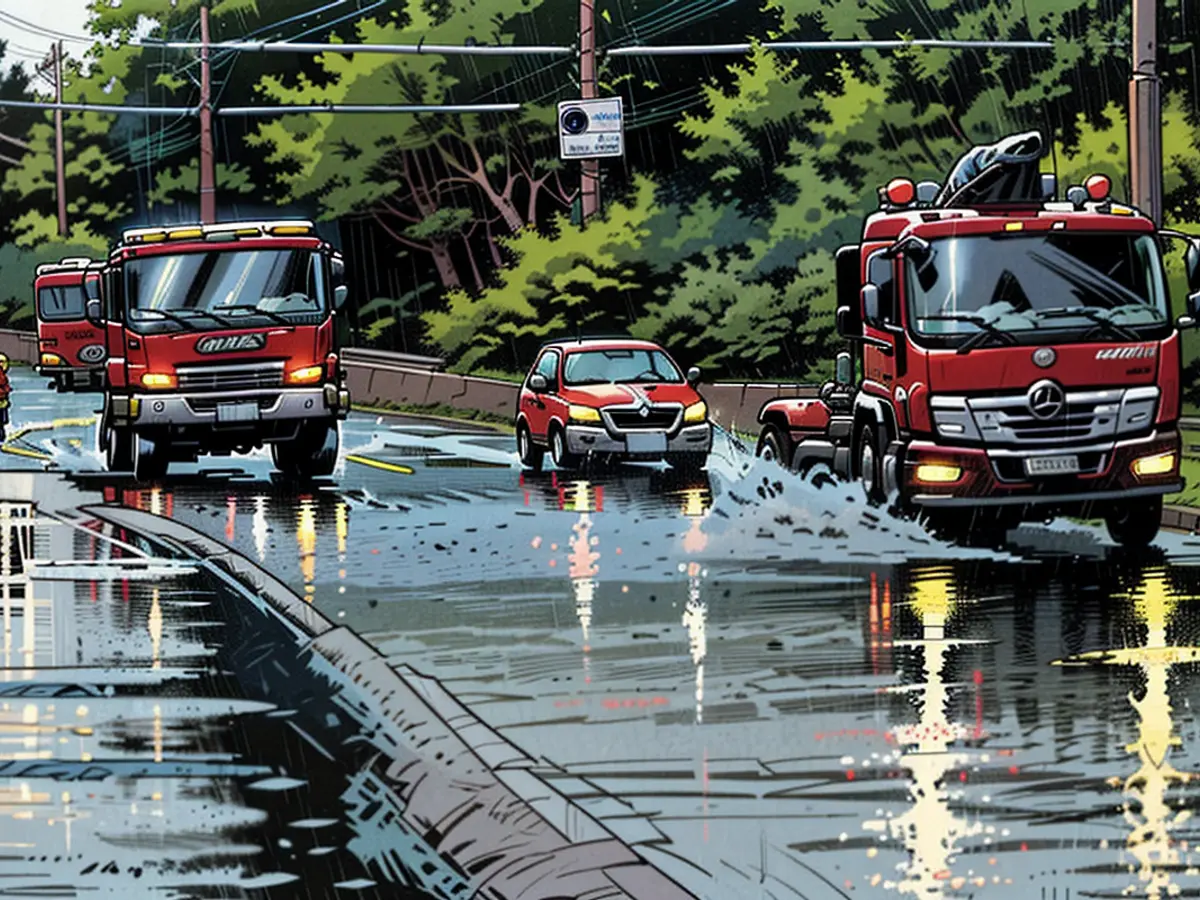Central Europe faces the looming danger of significant precipitation.
This upcoming weekend brings forth significant concern for authorities in Austria and the Czech Republic due to forecasted heavy rainfall. Austria has already issued a travel advisory, while Czech residents are advised to prepare for potential evacuations.
The week ahead will be characterized by intense rainfall, mainly focused on the German southeast. The Genoa low, named "Anett," is gathering water from the Adriatic and is expected to release a substantial amount over the Eastern Alps, particularly in the Czech Republic. The rainfall is not expected to subside until the start of the next week, leaving both Austrians and Czechs to face the impending adverse weather conditions.
In Austria and the Czech Republic, the heaviest rainfall will undoubtedly occur between Friday and Monday evening, with the Karwendel Mountains and the Berchtesgaden region experiencing 100 to 200 liters of rain per square meter. In contrast, Saxony, specifically the Ore Mountains, will receive 50 to 100 liters. The rainfall may cease temporarily on Sunday, but the quantities will still likely lead to local flooding and potential landslides.
Austrians and Czechs Brace for Rain Catastrophe
The situation is particularly precarious for regions extending from eastern Austria to the Czech Republic and southern Poland. For these regions, forecasts predict 250 to 350 liters of rain in the next three days. Lower Austria is highly susceptible to this deluge, with St. Pölten potentially receiving up to 430 liters of rain from Friday to Monday evening. To put this into perspective, Berlin's typical annual rainfall amounts to 581 liters.
The Danube River will experience heavy rainfall for a span of three days. Despite the Danube currently flowing through Germany with a low water level, the forthcoming rain amounts are projected to spark an extraordinary flood situation.
Fortunately for Austria, the cold temperatures accompanying the rainfall will aid their cause. The snowline has dipped below 1000 meters in certain areas, with up to 50 to 60 centimeters of fresh snowfall on mountains above 2000 meters, such as the Zillertal Alps. This will help the rivers as the water will remain as snow on the mountains.
Regrettably, the Czechs do not possess this advantage. The heavy rainfall predicted by certain models will total up to 470 liters, all of which will fall as rain. The water will primarily accumulate in the Elbe and be transported to Germany. Czech authorities have urged residents living in potential flood zones to prepare their evacuation kits and clear out their basements. Numerous dams have already released water to create additional capacities, and Czech Environment Minister Petr Hladik has likened the situation to the 1997 Oder flood and the 2002 Elbe flood.
German Authorities Warn of Power Outages
Austria has issued a travel warning from its federal railway company, and train service between Bad Hofgastein and Bad Gastein in the Salzburg region has been suspended due to heavy snowfall from Thursday to Friday. Several roads in Austria have been blocked due to fallen trees or stranded vehicles, with others, such as the Grossglockner High Alpine Road, temporarily closed solely for safety reasons.
Additionally, snowchain requirements are being enforced in specific areas, making travel conditions perilous for tourists in higher mountain ranges. A snowstorm in the Dolomites has tragically claimed the life of a Canadian woman. In Croatia, disaster services anticipate heavy rain, powerful winds, and potentially severe flash floods. Consequently, a level-two weather alert has been implemented.
Polish authorities have recommended citizens to prepare for potential flooding due to persistent rainfall. They have advised residents near rivers on the ground floor to prepare for flooding, and garages should be cleared and cars relocated to a secure location. It is also anticipated that there may be service interruptions in the drinking water and electricity supply.
In Dresden, a race against time is underway. The debris from the collapsed Carol Bridge remains in the Elbe, and alarm level 1 will be reached on Sunday – the lowest of four warning levels. By Wednesday, level 3 could be attained. The Elbe's water level could reach six to seven meters, while its normal level is two meters.
In light of the forecasted heavy rainfall, the Czech Republic is at risk of significant flooding, particularly in regions near the Elbe River. The anticipated rainfall of up to 470 liters in three days could lead to flooding similar to the 1997 Oder flood and the 2002 Elbe flood.
As a result of the heavy rainfall, many dams in the Czech Republic have already released water to create additional capacities, and residents living in potential flood zones have been advised to prepare their evacuation kits and clear out their basements.






